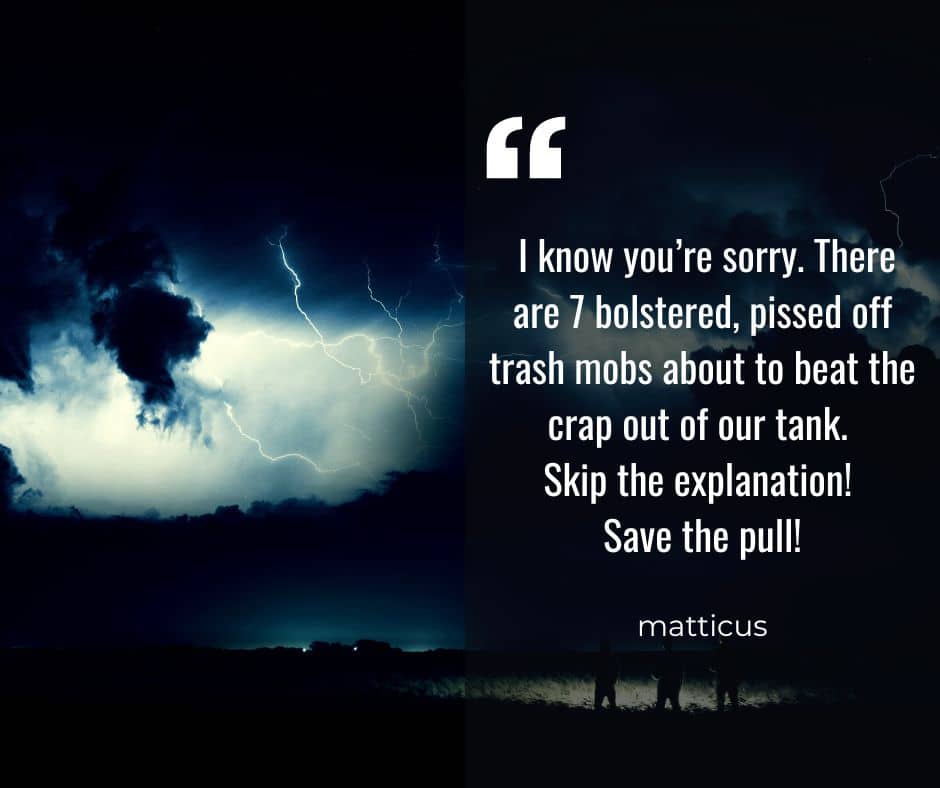We’ve all been there: You’re in the middle of a raid or dungeon in World of Warcraft, and someone makes a mistake. Maybe that mage pulled too many mobs, or goofed an interrupt. Whatever the reason, the immediate response from many players is to apologize, then explain what happened.
But is that really the best approach?
The problem with apologizing is that it can waste valuable time and tie up Discord communication. Instead of focusing on salvaging the pull, players spend time reassuring the person who made the mistake that it’s okay. I understand the desire to be considerate of others, but in the fast-paced world of dungeons, every second counts. I’ve run dungeons and raids with players who felt it necessary to say apologies, then follow up with a play-by-play of exactly what happened that led to the current situation.
Listen, I know you’re sorry but there are 7 bolstered, angry trash mobs about to beat the crap out of our tank. Let’s skip the explanation and help save the pull. While you’re on the floor trying to explain yourself, I’m mentally running through my checklist of how to react.
- Guardian Spirit on tank? Check.
- Psychic Scream to buy time? Check.
- Priest Roots and tell tank to kite mobs away? Check.
- Instruct the DPS Warrior named Zugzug to stop zug zugging long enough to hit Rallying Cry and get ourselves temporary health? Check.
- Fervently request Druid to take a few steps away from Volcanic to fire off a Battle Res? Check.
But none of this can happen while you’re rapidly apologizing and I can’t butt in to get a word in!
So, what can you do instead of apologizing? Here are a few alternatives to consider:
- Acknowledge the mistake
- Offer a solution
- Provide important information earlier
Let’s take a closer look.
Acknowledge the Mistake
When someone makes a mistake, it’s natural to want to apologize. But, apologizing can give the impression that you’ve done something wrong intentionally when the reality is most mistakes are unintentional. Try acknowledging the error without taking the blame, then saying what’s about to happen. For example, you could say something like, “Oops, I goofed. Extra pull coming.” Remember what Brad Pitt told Matt Damon.
Don’t use seven words when four will do.
Offer a Solution or Suggestion
In addition to acknowledging the error, it’s beneficial to offer a solution for how to move forward. For example, if someone whiffs an interrupt, you could suggest a strategy for how to handle them. This not only shows that you’re engaged in the group’s success, but it keeps the focus on salvaging the pull attempt rather than dwelling on the mistake.
In Azure Vault, if you’re sitting and watching for Waking Bane, you should mention that you can’t get Ice Bindings and pray someone else in the group can interrupt that cast instead.
Provide Important Information
Finally, you can also provide information that may be helpful for the group ahead of time. For example, if you notice a specific mob that has a particular ability, you could alert the group to this and suggest an approach for dealing with it. This kind of information-sharing not only helps the group to succeed, but it also alerts them on what to expect.
In Court of Stars, I habitually inform my group when we get to Gerenth the Vile that I can handle the first four Hypnosis Bats with a Chastise, a Psychic Scream, a Quaking Palm, then another Chastise. Anything after that needs a stun.
Once the group has recovered, if you feel the need to justify and explain what went wrong, feel free to go ahead. At higher key levels though, it’s often quite obvious as experienced players can recognize what happened or caused the error in play.
Although apologizing after a critical mistake is a natural response, it’s not always the most effective. Acknowledge the error, with a solution or suggestion. By doing so, you can help to keep the group concentrated and save the pull attempt quickly and efficiently.
